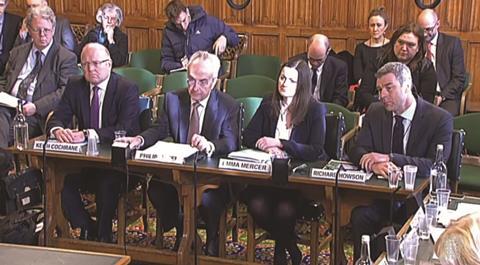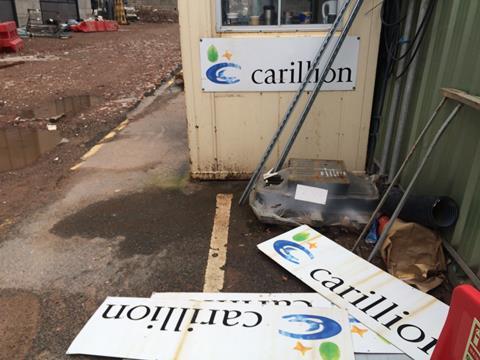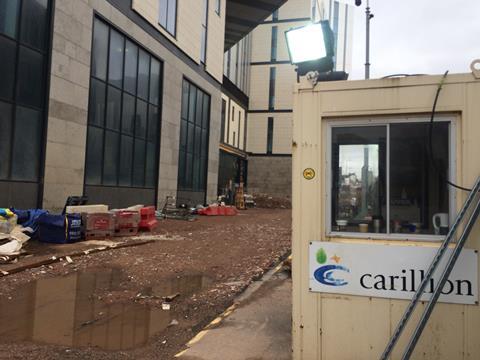Carillion, a former giant in construction, went bust one year ago today. We look back on a story that shook the sector 12 months ago through our coverage on the day, and through the numbers that accounted for its collapse
‘Carillion goes bust’ was the stark headline that confronted readers one year ago this week, on 15 January 2018. While not unexpected, it was hugely unwelcome, and the ramifications filled much of the following year.
On the day the firm failed, Carillion chairman Philip Green (pictured below, second from left) was quoted mourning the loss: “This is a very sad day for Carillion, for our colleagues, suppliers and customers that we have been proud to serve over many years.”

What was to unfold over the subsequent weeks, however, included investigations into Green and his fellow Carillion bosses’ culpability for the company’s failings and eventual demise. The headlines that followed tell their own story:
- ‘Recklessness, hubris and greed’ – MPs lay into Carillion directors
- Inquiry MPs say Carillion chairman ‘lacked even a tenuous grip on reality’
- Inquiry MPs say Carillion accounts ‘hoodwinked the government’
- Carillion inquiry MPs want pensions regulator to go after bosses’ £17m pay packets
Below is an extract of our story 12 months ago, as well as some of the key numbers that played a part in the downfall of one of the sector’s largest contractors.
Also read: One year after Carillion, PFI contracts can still be risky business
How the story broke - Building’s story from 15 January 2018:
Carillion goes bust
Company in compulsory liquidation
Carillion has gone under ending more than 100 years of history, leaving thousands of jobs at risk and a host of subcontractors facing the prospect of not being paid.
The move came after discussions over the weekend between the firm, its lenders and the government failed to reach a deal to save the company.
In a statement to the Stock Exchange this morning, the firm said: “Those discussions have not been successful and the board of Carillion has therefore concluded that it had no choice but to take steps to enter into compulsory liquidation with immediate effect.
“An application was made to the High Court for a compulsory liquidation of Carillion before opening of business today and an order has been granted to appoint the Official Receiver as the liquidator of Carillion.”
Now, what next?
Carillion’s collapse prompts a heap of questions, wrote Dave Rogers on 15 January 2018
It’s worth pointing out that Carillion’s finances must have been of the basket case variety given that it went straight into liquidation.
Many would have expected an administration but this morning’s news confirms the business had no assets to sell.
Now the company is being handled by the Official Receiver, because of the high number of government contracts it has, the questions about what happens to its 43,000 staff and those problem contracts hove into view.
Cabinet Office minister David Lidington told Radio 4’s Today programme: “The first priority, the one that I’ve asked ministers and all officials to concentrate on, is actually ensuring that public services continue.
“So the message to workers is, come in to work today, there’s important work to be done, and you will be paid. The government will pay your wages via the official receiver, not via Carillion.”
Carillion in numbers
Carillion was working on 420 public sector contracts when it went bust
The firm’s public sector revenue in 2016 totalled £1.72bn
It lost £234m on problem jobs such as prisons, hospitals and the Aberdeen road
Carillion underbid to make a £15m annual loss on a prisons contract
After its £845m July 2017 profit warning, the LGA told councils to prepare for Carillion’s collapse
7 days after the profit warning it won two big HS2 contracts, using these to convince suppliers to stick with it
The firm requested a £223m government bailout days before it went bust
There was only £29m left in the bank when it collapsed
The liabilities of Carillion’s 27 UK-based construction companies are estimated at £6.9bn
It is estimated that its construction arm owes subcontractors up to £1bn in retentions
Read: Carillion by numbers (published 12 July 2018)
Read: Carillion goes bust (published 15 January 2018)
Read: Carillion - a cautionary tale (published 4 August 2017)
Statistics were originally publlished in July 2018 and were correct at time of publication




























No comments yet